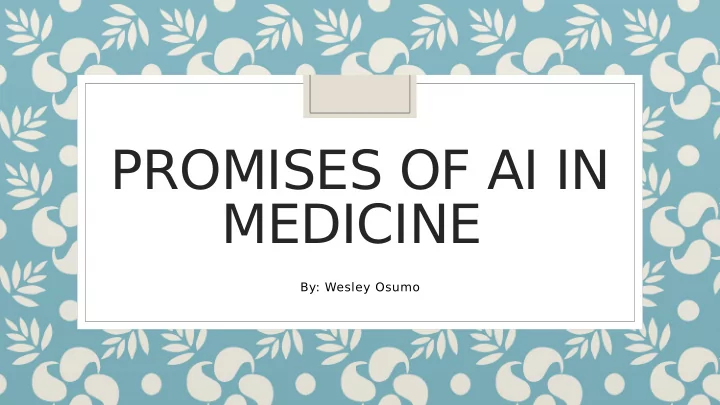

PROMISES OF AI IN MEDICINE By: Wesley Osumo
Why is AI the 80% of healthcare data is invisible to current systems 80% of healthcare data is invisible to current systems Future of because it’s unstructured (PWC). because it’s unstructured (PWC). medicine? Large volumes of Medical data is produced each year. Large volumes of Medical data is produced each year. • For example, for a skin specialist there are 11,000 new dermatology • For example, for a skin specialist there are 11,000 new dermatology articles published every year. articles published every year. Epidemic/Public Health Monitoring Epidemic/Public Health Monitoring • NYC Macroscope • NYC Macroscope
The two types of AI techniques Natural Machine Language Learning: processing: T ools that are able to Machines that are able analyze large sets of to read notes and images, structured unstructured data to be data, and genetic data used in machine to make inferences and learning analysis. diagnosis
Classical Machine Learning ◦ Unsupervised learning ◦ These are datasets that will produce a feature/outcome that we are not primary aware of. ◦ Supervised learning: ◦ using datasets to build a relationship between patient inputs(health rerecords) and outcomes(stroke, heart attack).
ML in Early detection of strokes ◦ Over 500 million people worldwide are afected by a stroke each year, and it costs the global economy $689 billion dollars. ◦ Villa's ML Algorithms: ◦ The device monitors movement inside the brain ,if activity is diferent from normal, an Alert for a stroke is generated. The data is extracted using a Markov model that yields 90.5% accuracy. ◦ SVM’s can identify strokes from images with 87.6% detection, and can predict treatment outcomes with 70% certainty.
Deep learning ◦ Encapsulated neural networks that are layered on top of each other. ◦ Mostly used for image analysis due to complexity of images. ◦ Used in Facial recognition , deep analysis, and classifcation problems. ◦ Convolution Neural Network: Deep learning algorithm used to analyze visual imagery ◦ When used for diagnosing cataract disease it yields a 90% accuracy and treatment.
Natural Language Processing Victor Castro identifed 14 Victor Castro identifed 14 cerebral aneurysms cerebral aneurysms disease-associated disease-associated Useful for extracting Useful for extracting variables through variables through unstructured data like unstructured data like implementing NLP on the implementing NLP on the textual information(medical textual information(medical electronic clinical notes. It electronic clinical notes. It and lab notes). and lab notes). was accurate 86% of the was accurate 86% of the time. time.
Doctors vs AI Whose more precise ◦ AI’s precision is between 85%-99% at diagnosing and model prediction. ◦ https://www.cbsnews.com/video/millions-of-americans-misdiagnosed-every-year/
Soo.. are doctors safe from the AI apocalypse in a cancer research study , 99% of the treatment recommendations from Watson are coherent with the physician decisions. The human ‘face-to-face’ element of healthcare is traditionally cited as vital to healthcare. And yet most doctors probably spend more time going over medical records and interpreting data from tests and other medical interventions than actually spending time with their patients. (PWC) AI’s can easily replicate this role , and be more accurate.
How do people feel about using AI in medicine? ◦ PWC survey of individuals willingness to engage with an AI in medicine ◦ 54% are willing to engage with an Ai ◦ (38%) are unwilling and 7% neither willing nor unwilling. (PWC)
Efects on healthcare costs ◦ It’s estimated global healthcare spending is going to reach 18.28 trillion dollars by 2040(WEF). ◦ How AI will reduce Healthcare costs: ◦ Reducing the demand of doctors ◦ Correctly diagnosing ◦ Early detection ◦ As treatments are getting better by applying new technologies, these incentives could be removed by changing to a pay-by-success model.(Samuel Piotr-emch)
Ethical Analysis ◦ Kantian ◦ A Kantian philosopher would approve of implementing AI into medicine, but doctors and healthcare workers must be there to prevent misdiagnosis or biases from the machine. ◦ algorithms designed to predict patient outcomes using genetics could form a bias from a lack of information pertaining to certain populations ◦ Utilitarian: ◦ The outcome of AI is more accurate and cheaper diagnosis. From a utilitarian perspective AI in medicine is a no-brainer. ◦ Negatives: Loss of medical work-force, and security of data. ◦ As AI techniques improve with time so will the accuracy of these models.
Key promises ◦ Early detection of diseases ◦ Autonomous Surgery ◦ Drug Discovery ◦ Online quality healthcare delivery ◦ Accurate prediction of individual health ◦ More personalized healthcare ◦ Epidemic monitoring ◦ Faster drug discovery
References ◦ Jiang F, Jiang Y, Zhi H , et al Artifcial intelligence in healthcare: past, present and future Stroke and Vascular Neurology 2017;svn-2017-000101. doi: 10.1136/svn-2017-000101 ◦ Cooper, P . W. (n.d.). What doctor? Why AI and robotics will defne New Health (Rep.). PWC.https://www.pwc.com/gx/en/industries/healthcare/publications/ai-robotics-new- health/ai-robotics-new-health.pdf ◦ Global spending on health is expected to increase to $18.28 trillion worldwide by 2040 but many countries will miss important health benchmarks. (n.d.). Retrieved from http://www.healthdata.org/news-release/global-spending-health-expected-increase-1828- trillion-worldwide-2040-many-countries ◦ Weintraub, A. (2018, March 16). Artifcial Intelligence Is Infltrating Medicine -- But Is It Ethical? Retrieved from https://www.forbes.com/sites/arleneweintraub/2018/03/16/artifcial-intelligence-is- infltrating-medicine-but-is-it-ethical/#5c53d9a73a24
Recommend
More recommend